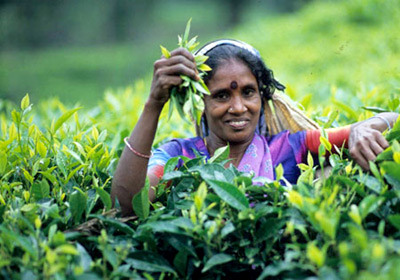'Greater focus on key issues vital to boost tea industry'
Tea is a global commodity. As the largest agrarian industry in Sri
Lanka providing direct and indirect employment to more than two million
people or nearly 10 percent of the population, it has contributed
greatly towards rural development and urbanisation of remote hilly areas
by optimum use of land and improving of social indicators among
communities.
 Sri Lanka's tea export earnings were Rs.160 billion in 2012 and
Rs.197 billion in 2013 the highest ever. However, negative reports
continue to place the industry in crisis. Sri Lanka's tea export earnings were Rs.160 billion in 2012 and
Rs.197 billion in 2013 the highest ever. However, negative reports
continue to place the industry in crisis.
Planters' Association of Ceylon (PA) Chairman Roshan Rajadurai said,
"It is a battle due to global competition, adverse climate and costs,
including labour. In an agricultural economy, any industry is dependent
on external factors, so it is always challenging, but not a crisis."
Sitting on the laurels of last year's record earnings will not serve
the future of the industry. Critical issues of replanting, rising cost
of production through systematic wage increases, labour shortages,
climate change, role of the smallholder and the outgrower model,
diversification, collective stakeholder involvement, training and
research and development are all areas where making incremental changes
is not enough, the need for significant shifts are vital.
One of the fundamental reasons for low yields has been the senility
of tea bushes, some of which are nearly one hundred years old.
"Replanting is very labour and capital intensive - one hectare being
replanted costs Rs.3.9 million. It will take 20 years to cover the
initial investment," said Rajadurai.
As a solution for inadequate manpower and financial resources, the
Budget Proposals 2013 provided a tea replanting subsidy up to Rs.
350,000 per hectare and increased new planting subsidy up to Rs.250,000
per hectare. According to Rajadurai, "Replanting is a national issue.
The Government has taken note of this and assured to make long term
funding on concessionary rates."
Regional Plantation Companies (RPCs) and Smallholders too are
involved in the replanting effort with RPCs having planted one third of
the existing vegetation in terms of new clearings. The Ministry of
Plantation Industries' Progress Report 2013 stated during January to
August alone "Land preparation of 519 hectares under tea replanting has
been completed and soil rehabilitation in 582 hectares was undertaken
and 457 hectares have been replanted with tea. Tea planting in 261
hectares has been initiated and planting has been completed in 126
hectares."
Tea is a labour intensive industry which brings a high wage cost
commanded by a strong labour union. Availability of labour in future
will be low due to the difficulty of retaining the next generation of
workers due to changing lifestyles. Sri Lanka's Tea Research Institute
sources said, "The plantation sector is facing a major shortage of
labour, which affects productivity and quality of the end product. In
view of this, it has become a matter of utmost importance to mechanise
the major field operations in tea cultivation." |

